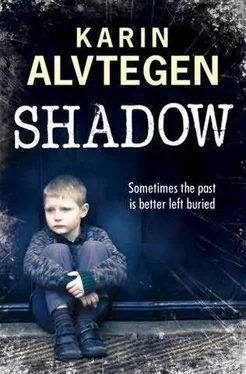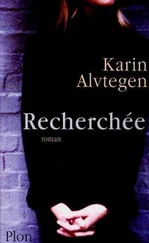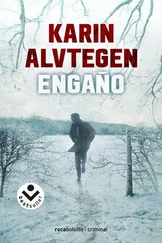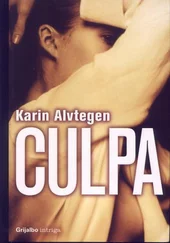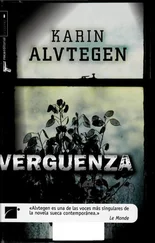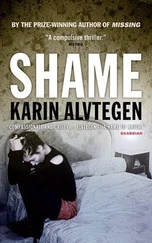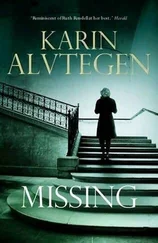Jan-Erik began to dig through the piles, at a loss as to where to start. Notebooks, reviews, letters from admirers, programme flyers for author visits and the follow-up articles in the press. Much of what he found he was interested in studying further, but he knew this was not the right time. Even finding a photograph of Gerda might take hours. He opened a cardboard box full of old letters and to his relief found some old photographs. He took the box over to the desk and sat down. He moved the typewriter and set the box in its place. The first photo was an old black-and-white snapshot showing his father’s parents; the next was in colour and more recent, and they looked just as he remembered them. They had come to visit occasionally, always formally dressed, his grandfather in a suit and tie and his grandmother in a dress. They had moved about the rooms cautiously as if they were afraid to knock something over. They would come on the occasion of some celebration, and he recalled that even as a child he had noticed the way his father changed. He had looked on in wonder as Axel suddenly lost his usual commanding presence and instead dashed about the house showing off his fine prizes and framed certificates. His grandparents had looked on wide-eyed but didn’t say much, except for trivial remarks about some detail of a frame. Otherwise they had seemed to be more comfortable in the kitchen with Gerda, who on those occasions was always welcome to eat with the family in the dining room. And he suddenly remembered one Christmas dinner when they had been using the fine china, and his grandmother had tipped over her glass on the white tablecloth. Her face had turned crimson despite all assurances that it didn’t matter in the least, and she hadn’t eaten another bite. Not until Gerda happened to tip over a half-full beer bottle ‘by accident’.
They had died in the mid-eighties, four days apart, and at the joint funeral Jan-Erik had seen his father cry for the first and only time.
He put the lid back on the box and went back to the cupboard, determined to start at a different corner. There was a box on the floor at the back. A tall pile of papers was stacked on top. He lifted them off and opened the box. The first letter was dated 1976 and was from a publisher, but the date showed that he was in the right time frame. He took the box out to the light in the office.
He found it somewhere in the middle of the pile, after he’d glanced through his father’s name and address on countless envelopes and other items of mail. It was not at all what he was looking for, but the printed text up in the corner attracted his interest. A brown envelope from the police. He pulled out a folded sheet of paper, and everything he thought he knew became meaningless in an instant.
It was a police report.
Annika’s full name, address, and Social Security number. The words underneath made his body react as though he’d been startled by a sudden bang.
Immediate cause of death: Hanging.
Manner of death: Suicide.
‘When you hear the tone – ding-a-ling – it means it’s time to turn the page. Now we’ll begin.’
Kristoffer pushed the stop button on the old tape player. Many years had passed since he’d listened to the cassette. When he moved it had been packed in a carton and always had its obvious place among his belongings, but now he could no longer listen to it.
If a person had been waiting for a phone call for thirty-one years and that call finally came, how would that person be expected to react? Kristoffer didn’t know. For five hours he had sat motionless on the sofa, incapable of feeling anything at all. The little scrap of paper on which he’d written the number lay beside him on the sofa cushion; occasionally he would turn his head to look at it.
Named as sole beneficiary in a will.
As long as he could remember, he had been afraid of the dark. He always slept with a light on when nobody else was around. Terror gripped him whenever what was revealed by the light disappeared into the dark; he had fantasies about what took shape when he could no longer see. Right now the room lay in darkness. Only the stubborn blinking from the closed lid of his laptop shone at regular intervals, pulsating like visual heartbeats. He hadn’t eaten, hadn’t called anyone, hadn’t done anything at all. Just sat there motionless, trying to decide what to feel.
Biding his time.
He had always waited. And yet he was incapable of pressing down the numbers on the telephone. Like a magic formula they would transport him to the desired place, the place he had always dreamt of, though he knew nothing about it.
Who would he be transformed into once he did arrive?
His ego had been formed on two foundations. One was everything that it was possible to see, everything tangible with which he could have a relationship. The second consisted of what had always been out of reach, the hidden world where he belonged but to which he had always lacked access. Who was he? Why was he the way he was? Did he have any genetic traits? What had been affected by what?
Who was it who had once chosen his name?
And then the fundamental question, the one he’d carried with him like an invisible stigma: why had he been abandoned?
The missing answers had become a part of his identity. Time after time he had been forced to invent his background, altering details when the old ones had worn out, adapting it to new demands.
All the conversations he’d been forced to listen to; about hopeless parents and insufferable family get-togethers, Christmases that had to be endured and family squabbles about weeks of holiday in summer cabins that were a shared inheritance. Bitter battles, broken family relations and sick parents who required time-consuming care. He had always hidden behind the claim that his parents were dead. Someone had even had the bad taste to express envy because he had the freedom to do as he pleased without having to be subjected to a guilty conscience.
All around him was emptiness. Everyone else he knew was anchored to a clear chain in which the links could be followed. But he hovered freely with nothing holding him. He dreamt of finding the chain that was his, the one that would become whole when the missing link was finally rediscovered.
Kristoffer had been about four years old when he moved in with his foster family. Apparently they had handled the situation as well as they could. They had answered his questions to the best of their ability, but what could they say when there were no answers to give? The police investigation had produced no result. He had only been able to give a first name for his mamma, and everyone named Elina had been contacted with no result. He had never named a pappa.
At ten years old his foster parents had taken him to Stockholm and showed him the steps at Skansen. He got to meet the guard who had found him, who had never been able to forget the experience. But none of the questions Kristoffer asked him had produced an acceptable answer.
Sometimes a vague sensation would float by, a second-long feeling rather than a memory. Always torn out of its context, squeezed in between dim and incomprehensible thoughts.
He had created his own truth for himself, convinced that his real parents would soon show up. Overjoyed at finally finding him again, they would take him home to his real life, away from the life where he was simply waiting. They would explain how crushed they had been, how a horrible witch had locked them in a tower and refused to let them go. How they finally in spite of difficult hardships managed to escape, prepared to do anything to see him again. Over the years his fantasies had developed and the explanations became less like fairy tales, but the feeling that he was living in a temporary situation had never left him. He decided that it wasn’t worth immersing himself in anything, since at any moment he would have to start over.
Читать дальше
